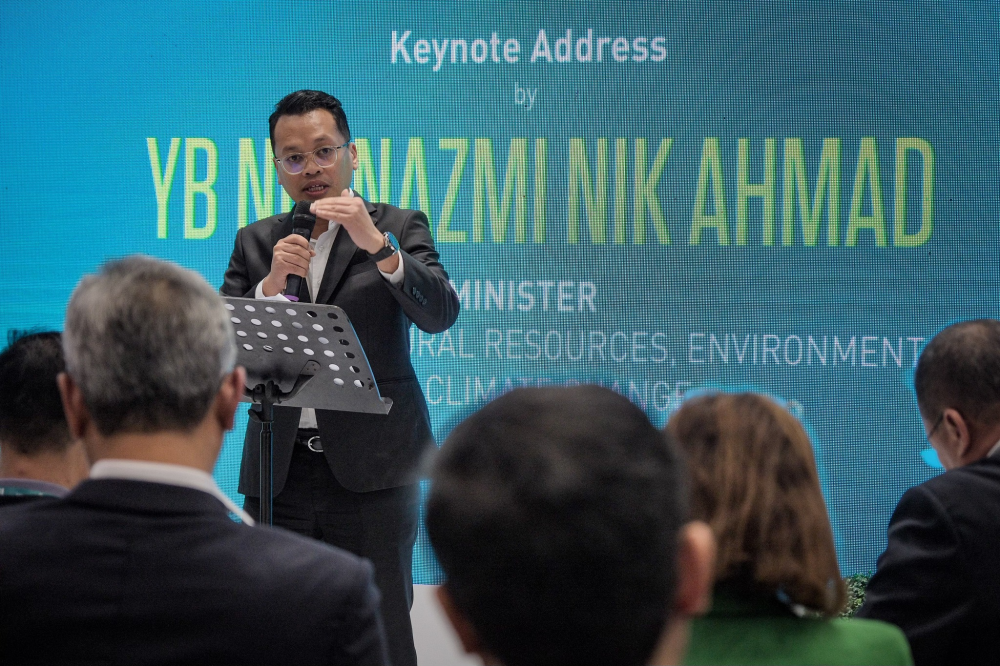Evaluating the Natural Resources, Environment, and Climate Change Ministry and charting path for improvement
USHAR DANIELE
SHAH ALAM - In the ever-evolving landscape of climate change and sustainability, the Ministry of Natural Resources, Environment, and Climate Change, led by Nik Nazmi Nik Ahmad, has faced a year of scrutiny and evaluation.
While the ministry initiated various programmes to reduce Malaysia's carbon emissions under the nation's Paris Agreement commitments, concerns have been raised by observers and non-governmental organisations (NGOs) regarding the administration's conservation objectives alongside its climate goals.
Forestry Focus: A Call for Systemic Change
Independent NGO RimbaWatch has highlighted timber and oil palm plantations as the major contributors to deforestation in Malaysia. Adam Farhan, co-founder of RimbaWatch, criticises the absence of policies or initiatives targeting this issue. Emphasising the need for systemic changes, Farhan insists that without addressing these concerns, the ministry's impact on forest ecosystems and biodiversity will remain limited.
Using data and satellite observations, RimbaWatch has identified over 2.5 million hectares of affected forest, flagging thousands of environmental abuses.
Frustrated by authorities withholding crucial data, Farhan said, "The continued secrecy on forest locations impedes our work."
While acknowledging minimal illegal logging, he underscores the necessity for a systematic approach to halt deforestation and protect endangered species.
Farhan challenges the Ministry's approval of monoculture timber plantations in intact forest reserves, suggesting that such decisions should fall under the purview of the Department of Environment (DOE).
Adam Farhan draws attention to Malaysia's silence on the role of domestic fossil fuel expansion in global environmental changes.
He urges the Ministry to compel the DOE to impose a moratorium on all new fossil fuel projects unless aligned with a 1.5-degree pathway, underscoring the need for proactive measures in climate action.
Marine Conservation: Mixed Signals and Challenges
The rejection of the proposed Tioman Airport by the cabinet earns praise from Natasha Zulaikha Zahirudin, co-founder of Coralku, who applauds the minister's commitment to marine conservation.
However, Natasha notes a lack of effort in improving policies and ocean conservation through habitat restoration, particularly when compared to terrestrial conservation or the energy sector.
The proposed Tioman Airport, covering 186.36 hectares within a marine park boundary, faced community and conservationist opposition in 2023, leading to its abandonment.
Natasha highlights Malaysia's commitment to protecting at least 10 per cent of its land and marine areas under the International Convention on Biological Diversity.
However, she points out that the country currently stands at 5 per cent, with challenges stemming from the unclear jurisdiction over ocean conservation.
Natasha emphasises the disjointed approach to ocean conservation, where the Department of Fisheries (DoF), an extractive-based ministry, lacks a dedicated focus on preservation or conservation.
She advocates for a standardised approach to support marine conservation, aligning with efforts in terrestrial conservation, the energy sector, and the ongoing battle against the climate crisis.
Transboundary haze: A smoggy problem
Greenpeace Malaysia has actively called for a Transboundary Haze Pollution Act (THPA) to be introduced following many previous agreements starting with the 2002 ASEAN Agreement on Transboundary Haze Pollution ratified in Kuala Lumpur.
Malaysia was the first signatory.
In a statement, Greenpeace stressed that regional diplomatic cooperation should not be an excuse to delay enforceable laws such as the THPA.
On Nov 7, the government decided to not table the proposed THA aimed at taking action against Malaysian companies or individuals that are found responsible for haze, regardless of where the source of burning occurred.
Greenpeace criticised the government’s decision to withdraw the proposal for the Transboundary Haze Act.
Greenpeace Southeast Asia, Heng Kiah Chun, Regional Campaign Strategist said the transboundary Haze Act (THA) was necessary as a deterrent, ‘especially if there are bad apples in the industry’.
“It can provide legal grounds for each country to institutionalise checks and balances to ensure their own companies operate responsibly”, Heng said in the statement.
Striking a balance in the next act
As Malaysia grapples with the complexities of climate change and environmental conservation, the Ministry of Natural Resources, Environment, and Climate Change, guided by Nik Nazmi Nik Ahmad, faces scrutiny and calls for improvements. Suggestions for policy adjustments and systemic changes have been voiced, addressing concerns related to deforestation, fossil fuel expansion, and marine conservation.
The next phase of the ministry's journey undoubtedly involves a delicate balance between ambitious climate goals and robust conservation efforts.
Download Sinar Daily application.Click Here!














